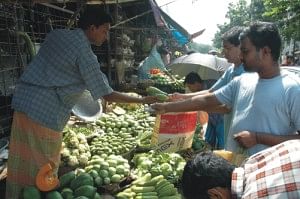Food prices the wild card in the deck

Photo: Amirul Rajiv
ALL the good achievements of the caretaker government seem to be facing serious challenges in the wake of high prices of food, particularly rice. The global food shortage and galloping increase of food prices, and their impact on Bangladesh in recent months, are not understood by the poor masses. All they understand is the price structure that existed during the rules of Hasina and Khaleda, and compare it with the prices they are paying at the moment.
The question they ask is: "Are we better off now than three years or eight years back?" All they are interested in is the rise in prices of food and other basic essentials.
The caretaker government has the following major achievements to its credit:
- They made our streets and homes safer from muggers, toll collectors, and mafias,
- Created an effective Anti-Corruption Commission by selecting a non-controversial, competent, incorruptible, well motivated, creative and unblemished person to head the organisation, together with some other praiseworthy individuals who comprise the team,
- Reorganised and restructured the Public Service Commission, which enjoy public confidence to a large extent,
- Reorganised the Election Commission with some respectable impartial citizens who are committed to deliver good results to the country,
- They separated judiciary from the administrative service, which was being debated and was under active consideration of the government for a quarter of a century.
These are not their only achievements. Other national issues, which they tackled effectively with reasonable degree of success, cannot be covered in this article.
The sad part of the whole issue is that all this is vanishing from public memory to the advantage of some hungry, powerful, corrupt political leaders waiting to return to the pre 11/1 days to exploit the food prices issue.
The high prices of food grain are not the creation of this government, they are global phenomena. It is ill-luck for Bangladesh and the caretaker government that the country faced three disasters in 2007, which has largely contributed to shortage and high prices of rice and other agricultural commodities.
One significant reason for the caretaker government's fall in popularity is perhaps the selection of the advisers, who were not necessarily selected very judiciously and wisely. The selectors should have gone out and found the best experienced, talented and impartial personalities that Bangladesh could offer.
Food prices are affecting everyone all over the world, including the US. Asians, Africans, and Latin Americans are the major victims. Governments in many countries are facing food riots. Argentina, the Philippines and Kenya are among those countries.
Musharraf of Pakistan lost the election primarily because of the escalating prices of flour and other food items. The present government in Pakistan will face this challenge in the months to come. People are standing in breadlines in many countries. People in the Philippines are spending 68%, Indonesia 78%, and Egypt 69% of their income on food. In the land of abundance of food, namely US, people are complaining about the high cost of food, which has jumped to 18% from 12% of their income in six months.
From Mexico to Pakistan, violent protests over food prices were witnessed. West African nations have seen violent attacks on government offices and looting of food godowns.
The high prices of food grains, and shortages, are likely to continue for several years, and our country needs to prepare to avoid disaster. No matter who runs the government, the caretaker government, military government or democratic government, the country will face a very challenging time in the years to come.
The World Bank estimates that the recent food price increases will push another 100 million people globally into extreme poverty and starvation. It will take at least several years to stabilise world food shortages and millions are likely to starve and perish. The tragic implication is serious enough, unless something is done quickly in a planned manner to meet the challenge.
Political governments in the past robbed our country and, today, two former prime ministers, three home ministers and dozens of other corrupt powerful political figures are in custody on corruption charges.
During their time, the country earned the status of world's number one corrupt country. Some hungry politicians are out shouting for western prescribed democracy and the release of those leaders who brought misery to the people of Bangladesh. These politicians have no solid base, they want to contest election under the wings of the two ladies, who succeeded in coming to power by playing on innocent public emotion and taking advantage of their murdered father/husband who were once the country's revered national leaders.
Additionally, our eagerness to quote Boucher and Anwar Chowdhury on democracy and human rights is not going to help much in overcoming the food shortage. The corrupt politicians returning to power may not help Bangladesh much in reducing the high prices of food and other essentials, or preventing a possible violent public outburst.
Bangladesh's future will depend on how well we plan and implement actionable agro-based programs to make the country self sufficient in food, and feed the growing population of 150 million people with dalbhat.

 For all latest news, follow The Daily Star's Google News channel.
For all latest news, follow The Daily Star's Google News channel. 




Comments